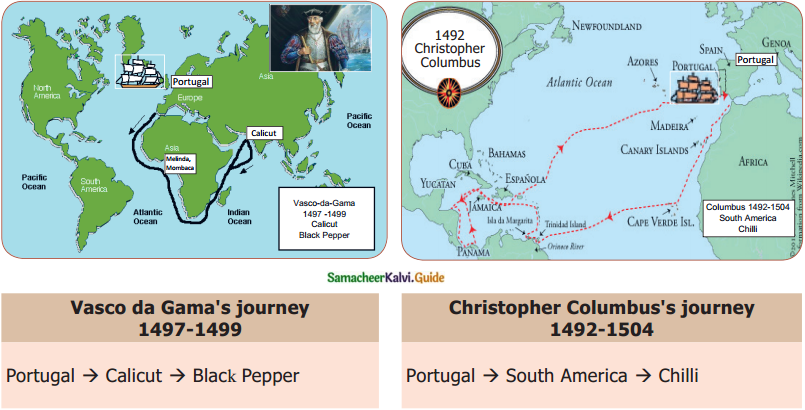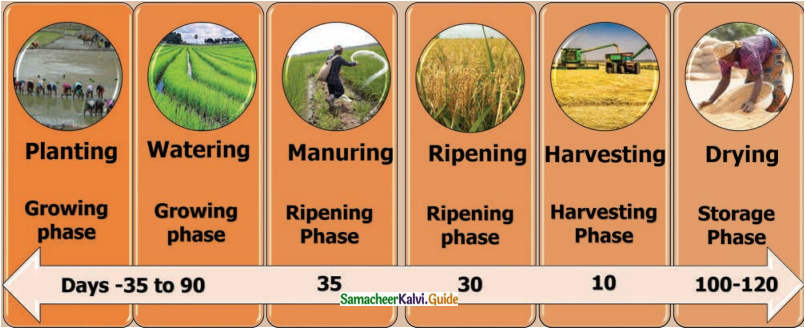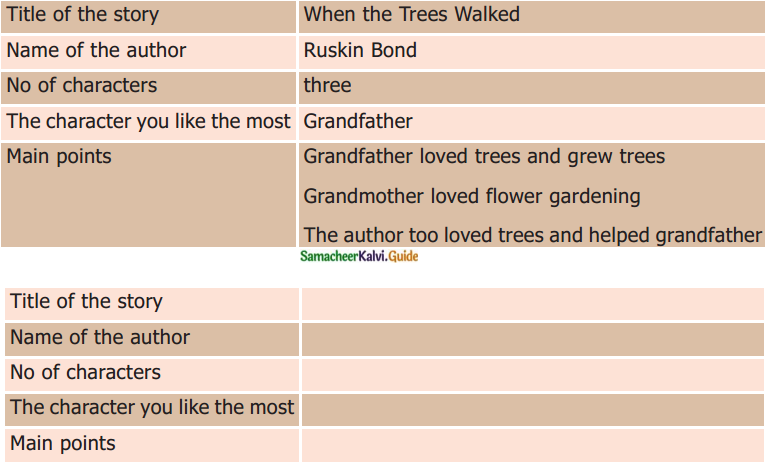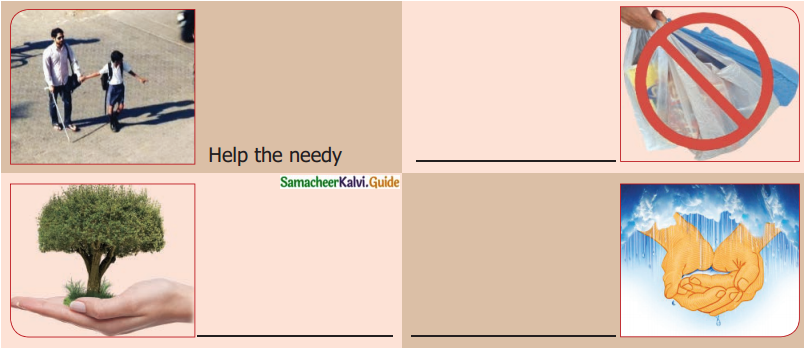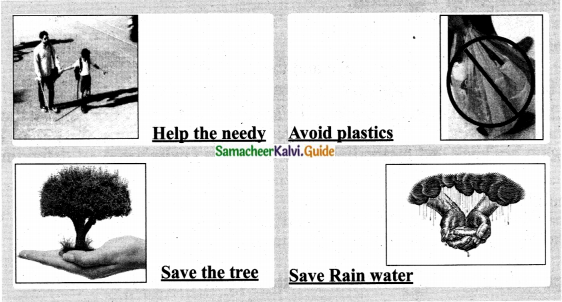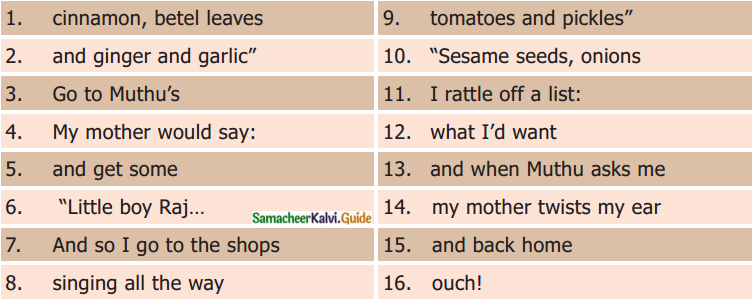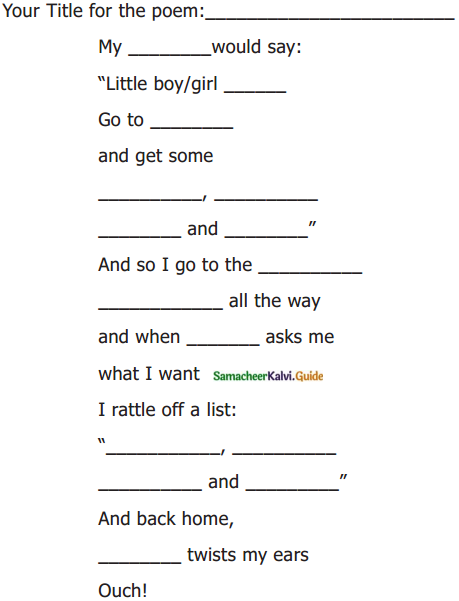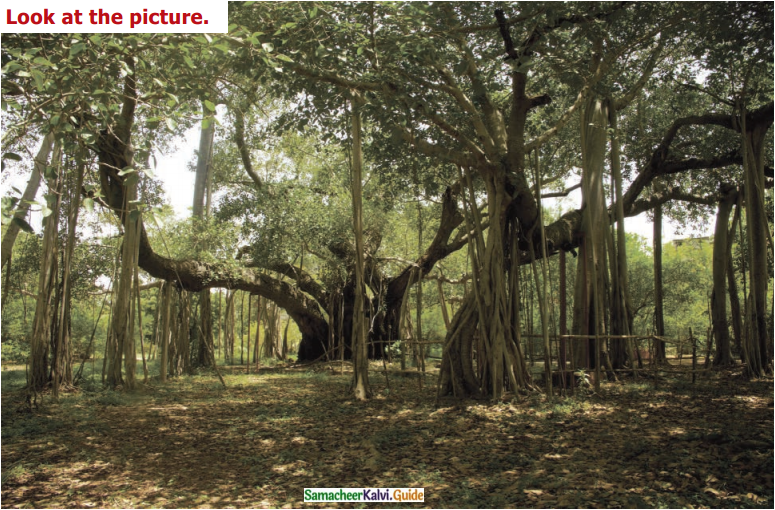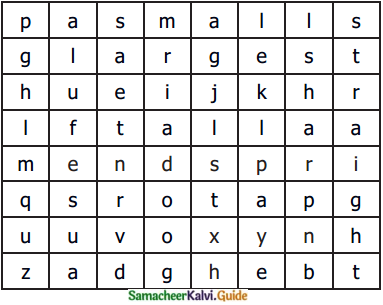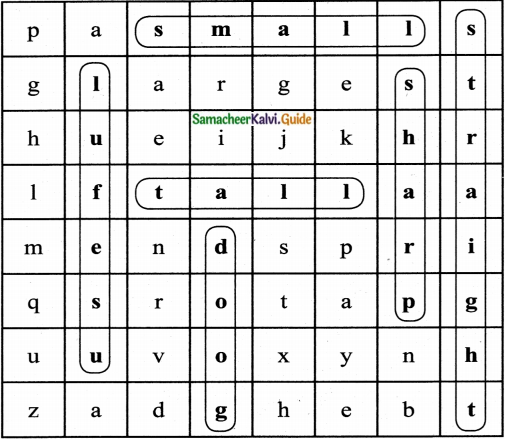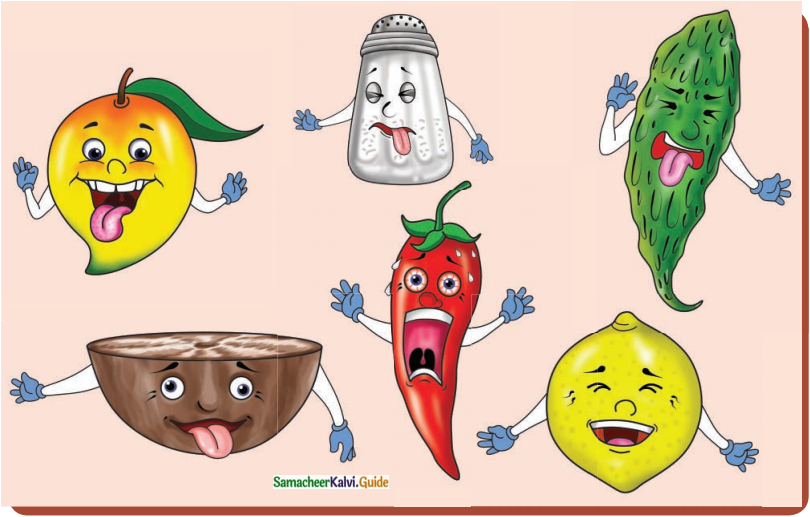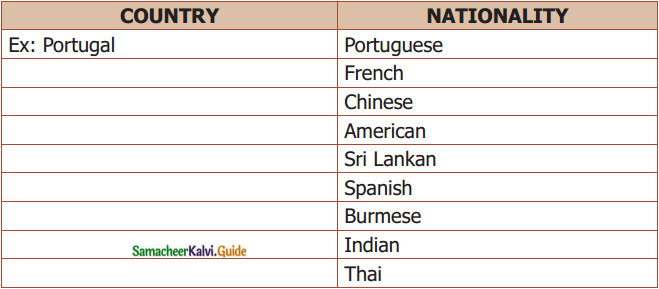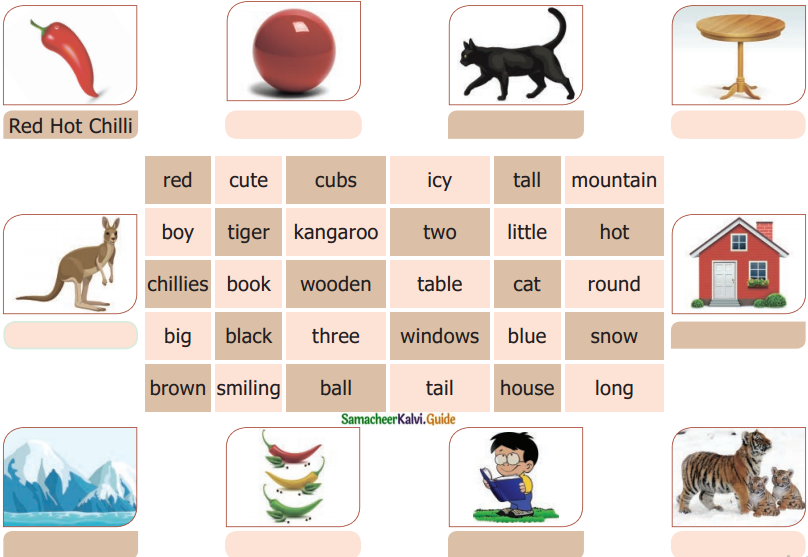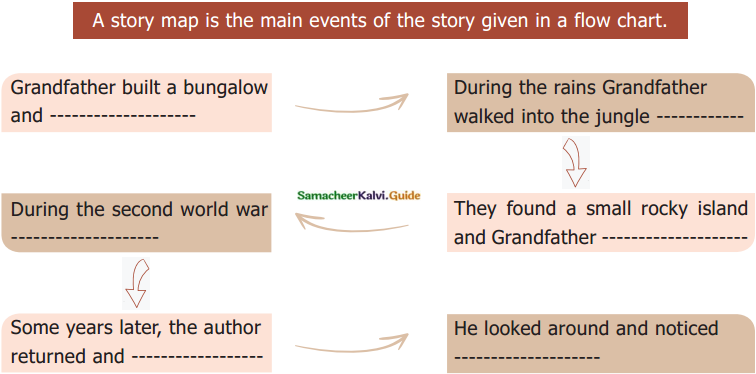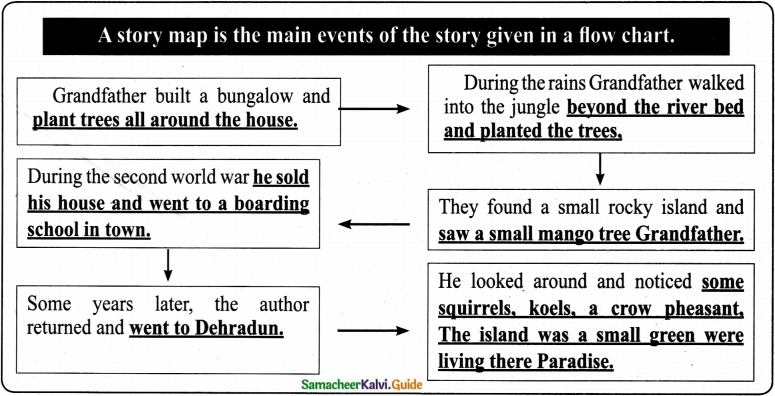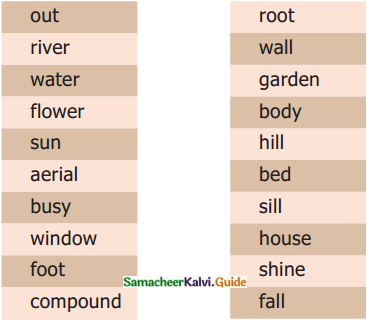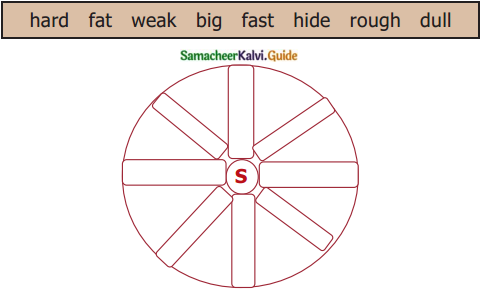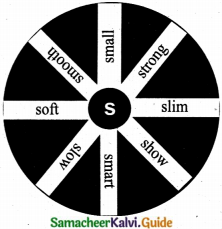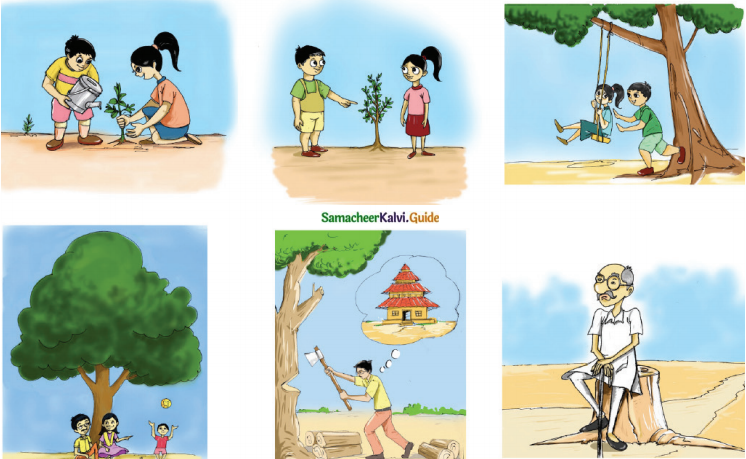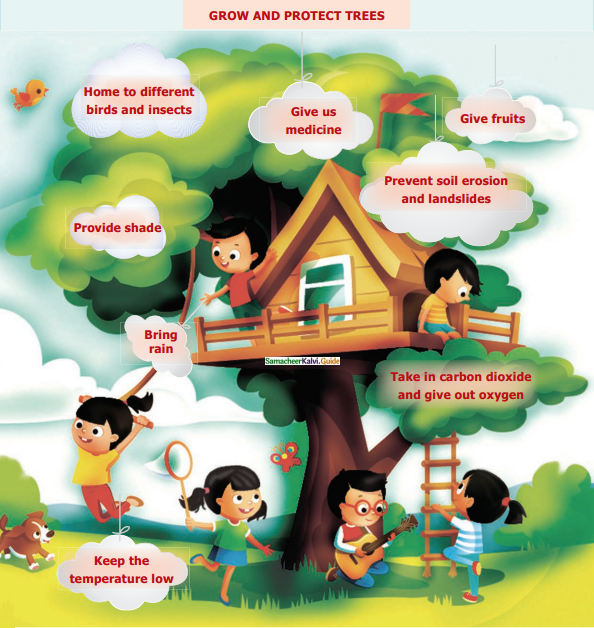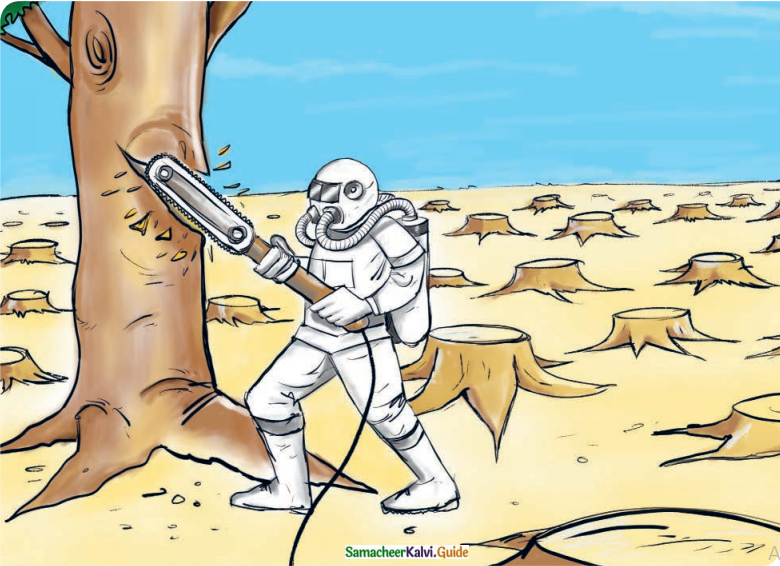Tamilnadu State Board New Syllabus Samacheer Kalvi 6th English Guide Pdf Term 2 Prose Chapter 1 Sports Stars Text Book Back Questions and Answers, Summary, Notes.
Tamilnadu Samacheer Kalvi 6th English Solutions Term 2 Prose Chapter 1 Sports Stars
6th English Guide Sports Stars Text Book Back Questions and Answers
Warm Up (Text Book Page No. 82)
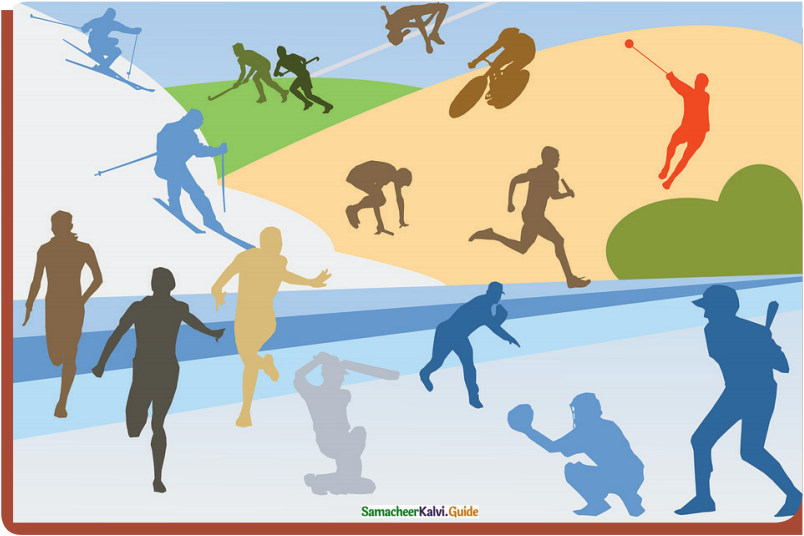
MIRRORING
The teacher selects three pairs. The pairs are made to stand facing each other. The teacher whispers a game to each pair. One person makes a movement, the other tries to mirror the movement or copy it exactly. Then they change roles. When both have played both roles, try to coordinate movements with each other, so that both become player and mirror at the same time. Then the rest of the class have to find out which sport they are mirroring.
eg: Passing the ball, kicks for karate, bowling the ball, batting etc…,
Section -I
Textual Exercise (Text Book Page No. 84)
Put a (✓) for the correct and (✗) for the incorrect statements:
- A school-going girl writes a diary account. (✗)
- The boy was so inspired by Mithali that he was happy for his sister to play cricket. (✓)
- Mithali Raj is happy to be recognised as Tendulkar of Indian Women’s Cricket. (✓)
- Women should not be compared with men in cricket, says Mithali. (✗)
- Mithali Raj was not encouraged to play cricket by her family members.
- Mithali is one of the women players to score seven consecutive 50’s. (✓)
- Mithali’s mother tongue is Telugu. (✗)
Section -II
Textual Exercise (Text Book Page No. 85)
Answer the following briefly:
1. When did Usha Rani start playing Kabaadi?
Answer:
When she was a schoolchild Usha Rani started playing Kabaadi.
2. What did she sell to support her family?
Answer:
She sold flowers to support her family.
![]()
3. Find out the idiom that relates to ‘whatever the circumstances’, from the first paragraph.
Answer:
‘Rain or shine’ is the idiom that relates to ‘whatever the circumstances’.
Identify and write the sport’s name respectively.
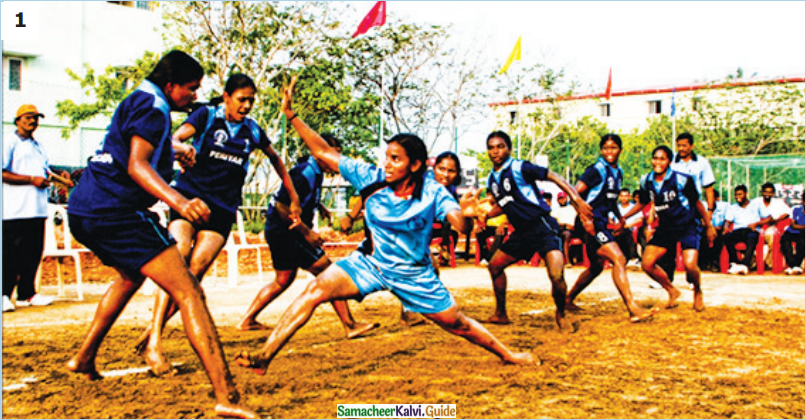 1. Kabaadi
1. Kabaadi

2. Shuttle cork

3. Cricket
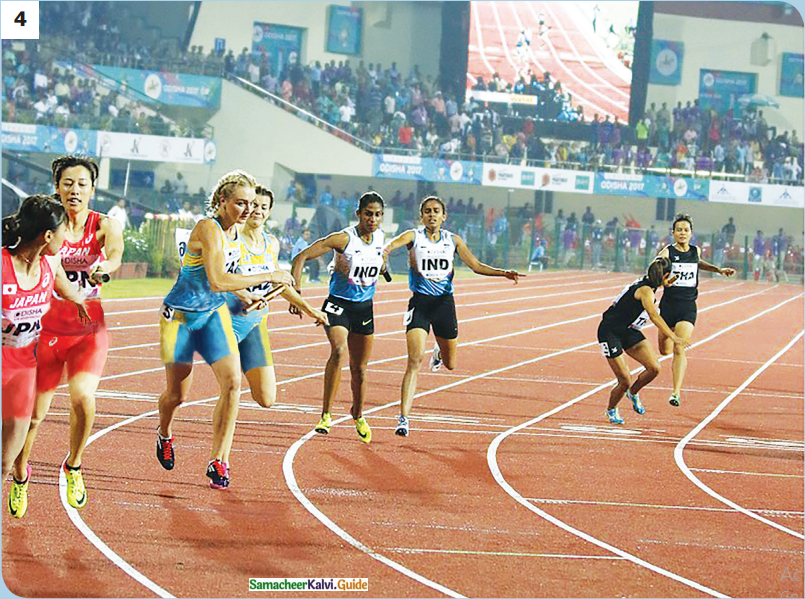
4. Relay Race
Every person who achieves success in life has to work hard with dedication and determination. One can always leam something from another person’s story. No opponent is too big to defeat. So believe in yourself and follow your passion.
Section -II
Textual Exercise (Text Book Page No. 89)
Complete the mind map given below.
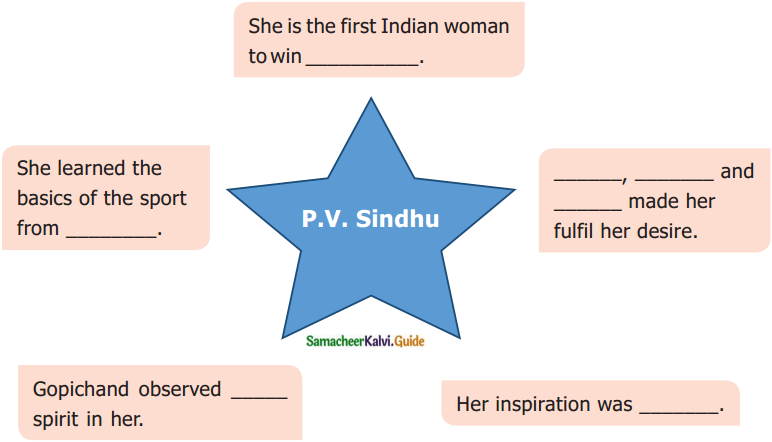
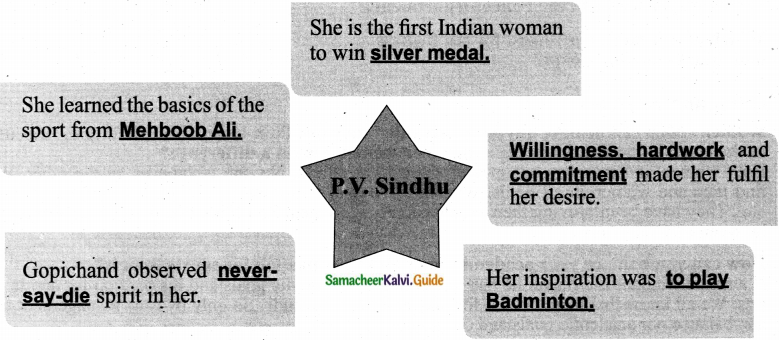
Read and Understand (Text Book Page No. 90)
I. Identify the sports and the sports personalities from the lesson and fill in the table:

Answer:
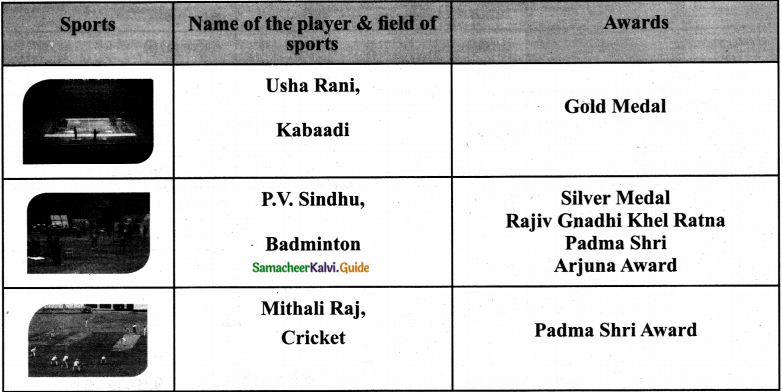
II. Read the questions related to the three sports stars you have read about and tick the appropriate boxes.
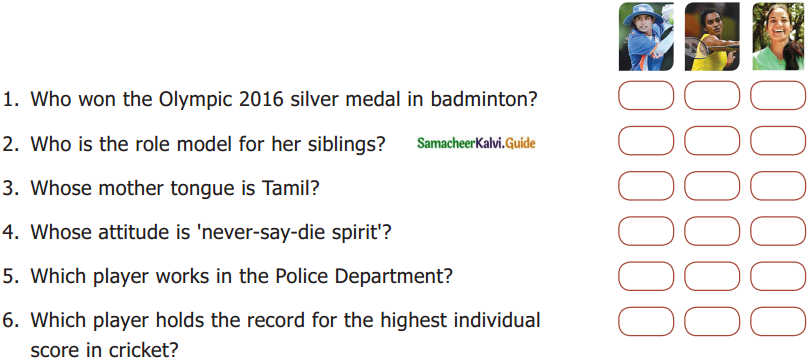
Answer:
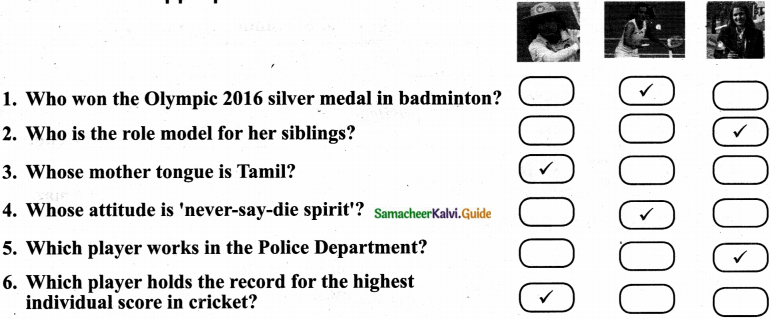
III. Think and answer:
1. Women / Men can achieve anything, provided they put their heart and soul into it. Discuss in the class. Do you think being a man or a woman makes a difference?
Answer:
Both women and men can achieve anything in any field. No one is superior to the other. We find men and women in all fields. Women are on par with men in cricket, kabaddi, badminton, etc., They have been proving their mettle equally with men. So I think that there is no difference between men and women.
![]()
2. How can you balance your academic goals and your passion for sports or arts?
Answer:
If a school student is a player he has to balance his academic goals and his passion for sports or arts. We all know that there is time for play and time for study. So only by time management, we can balance our academic goals and our passion for sports or arts.
Vocabulary (Text Book Page No. 91)
A. Match the sport and the equipment:
| 1. Football | Bow and arrow |
| 2. Tennis | Club |
| 3. Golf | Net |
| 4. Volleyball | Racquets |
| 5. Archery | Helmet |
Answer:
| 1. Football | Helmet |
| 2. Tennis | Racquets |
| 3. Golf | Club |
| 4. Volleyball | Net |
| 5. Archery | Bow and arrow |
B. Find the names of twelve sports and games from the grid.
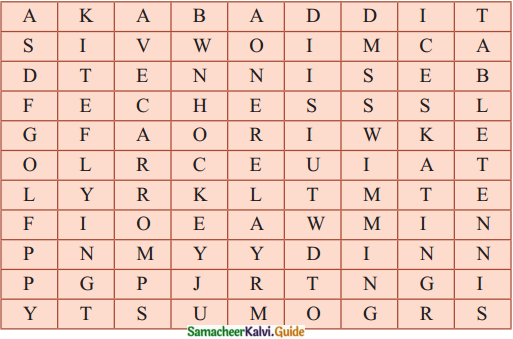
Answers:
- Kabaddi
- Tennis
- Chess
- Golf
- Table Tennis
- Swimming
- Skating
- Kite flying
- Carrom
- Hockey
- Relay
- Cricket
C. Tick the meaning of the italicized word.
1. Being compared to Sachin is an absolute privilege.
a) Honour
b) Right
c) Favour
d) Disadvantage
Answer:
a) Honour
2. The boy was taken by surprise when he learned about Mithali Dorai Rai.
a) Affected
b) Moved
c) Amazed
d) Upset
Answer:
c) Amazed
![]()
3. Usha Rani had to struggle all through her life.
a) Fight
b) Duel
c) Fun
d) Work hard
Answer:
d) Work hard
4. Usha Rani is an expert at giving leads.
a) Clumsy
b) Sharp
c) Skilled
d) Bad
Answer:
c) Skilled
5. No opponent is too big to defeat.
a) Competitor
b) Rival
c) Helper
d) Enemy
Answer:
b) Rival
D. Fill in the blanks with the opposites of the words given in brackets. (Text Book Page No. 92)
1. We should learn from our …………………… (success).
Answer:
failure
2. Children don’t like to read …………………… (interesting) books.
Answer:
boring
3. Be …………………… (general) when you are telling us what you need.
Answer:
particular
4. The teacher asked the children to …………………… (start) talking.
Answer:
stop
![]()
5. The new boss decided to …………………… (appoint) the lazy workers.
Answer:
dismiss
Listening
E. Listen to your teacher and number the pictures accordingly.
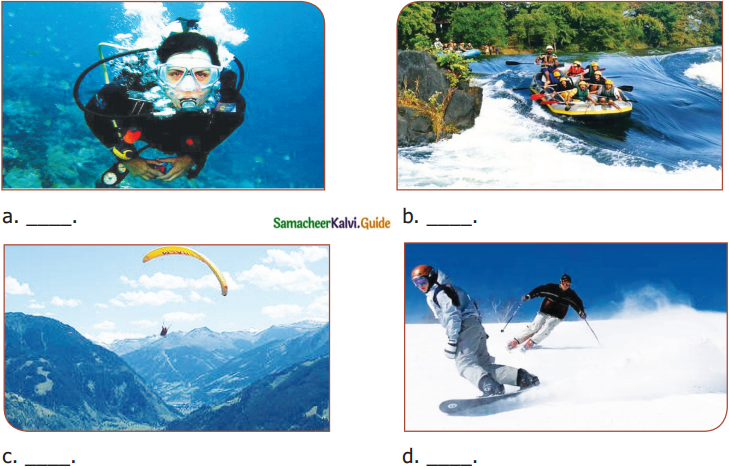
Answer:
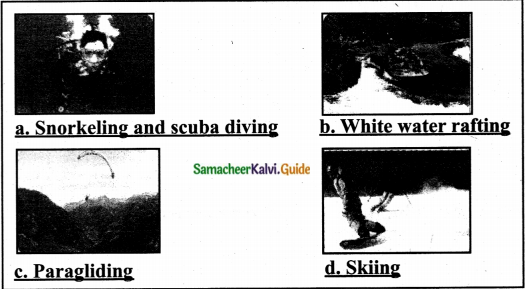
Write ‘T’ if the statement is True and ‘F’ if the statement is False.
- Himachal Pradesh is an ideal place for paragliding. (T)
- Skiing offers opportunities to delve into oceans. (F)
- Paragliding is also a recreational adventure sport. (T)
- Scuba Diving has a huge following all over the world. (F)
- The most suitable period for skiing is from March to June. (F)
Speaking (Text Book Page No. 93)
F. Look at these images of different kinds of sports. Identify and name as many as you can with your partner.
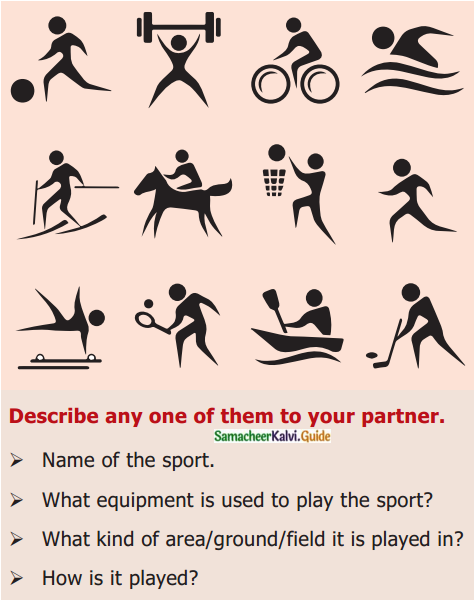
Present your sport to the class in four to five sentences.
These phrases will help you.
I Like to play cricket.
I play it regularly with my friends.
It is an outdoor game.
The Cricket requires eleven players.
The game has required this equipment.
It is generally played on the ground.
I enjoy playing the game.
Use Grammar (Text Book Page No. 94)
G. Look at the picture and fill in the blanks with suitable words.
1. There is a …………………. ground in my school.
Answer:
large
2. The …………………. sky looks beautiful at night.
Answer:
dark
3. The tray has …………………. vegetables.
Answer:
fresh
![]()
4. It is a …………………. day
Answer:
rainy
5. The girl gave her friend a …………………. smile.
Answer:
sweet
H. Put the words in the correct order and rewrite each sentence. (Text Book Page No. 95)
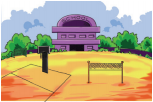
1. They have a post-box. (Red, Small, Rectangular)
Answer:
They have a red small rectangular post box.

2. I have stuck. (Long, Two, Brown)
Answer:
I have two long brown sticks.

3. Find me the brushes. (New, Five, Yellow)
Answer:
Find me the five new yellow brushes.
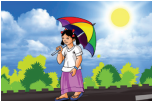
4. Mahesh is a boy. (Thin, Tall, Clever)
Answer:
Mahesh is a tall, thin, and clever boy.

5. It is a plate. (Round, Pink, Small)
Answer:
It is a round small pink plate.
I. Refer to a dictionary for the meanings and circle the odd one.


Writing (Text Book Page No. 96)
J. Imagine that you are the sports captain of your school. Write a formal letter to the sports Captain of another school inviting her/ his team for a friendly match. You may choose any sport. Give details of time and place.
| From
S. Raghul, To Mr. Mohan, Dear Mohan, We kindly invite you to pl^y with our team a friendly match in cricket. We can have the match on 3rd September at 3 p.m. on our school grounds. We hope you will also be happy to play with us. Please send us your acceptance immediately. Madurai Your’s loving, |
Creative Writing (Text Book Page No. 97)
K. Make a diary entry on the impact of a sports personality who is an inspiration to you.
I have recently read about Usha Rani a kabaddi player. Her life impressed me very much. She has come from a poor town. She became determined to become a kabaddi player to fulfill her mother’s dream. She joined a club to be trained as a kabaddi player. She started playing kabaddi at the National level in the Sub-junior category.
She sold flowers to support her parents. She had been struggling until she got a job in the Karnataka State Police Force.
Usha participated in national events every year without a miss. She is skilled in giving leads, raiding opponents, and consistently playing an important role in the Indian kabaddi team. Now she is working hard and practicing every day to win the Gold medal at the Asian Games in 2020.
My joy knew no bounds when I read her biography. I’m sure that if a woman wants to achieve anything in life, she can succeed in it. I’m proud of a woman.
Sports Stars Summary in English
Section -I
Mithali is an Indian woman cricketer. She started to play cricket at the age of 10. She was selected for the Indian team at the age of 17. The first player to score seven consecutive 50’s in the International arena. She is compared to Sachin. She felt it a privilege. But she wants people to know her for her own Identity. The government of India conferred on her the Padma Shri Award for her contribution to India.
Section – II
Usha Rani is a cup and Kabaadi champion rose from Shantytown. She sold flowers to support her parents until she got a job in the Karnataka State Police Force. At 29, she won a gold medal in Kabaadi. She is a role model to other fellow sportspersons.
Section – III
P.V.Sindhu, a famous Badminton player, won Bronze in the 2012 Olympics, she won silver in the 2016 Olympics. She started to play Badminton at the age of 8. She travelled at a distance of 56 km from her residence to the coaching camps. Her commitment and hard work never-say-die- spirit made her succeed in her life.
Sports Stars Summary in Tamil
பகுதி – I
மிதாலி ஒரு பெண் கிரிக்கெட்டர். அவர் தனது பத்து வயதில் கிரிக்கெட் விளையாடத் தொடங்கினார். அவர் தனது 17 வயதில் இந்திய அணிக்கு தேர்வு செய்யப்பட்டார். சர்வதேச அளவில் தொடர்ச்சியாக ஏழு 50 ரன்கள் எடுத்த வீராங்கனை. அவர் சச்சினுடன் ஒப்பிடப்படுகிறாள். அவள் அதை சிறப்புரிமையாக உணர்ந்தார். ஆனால் அவருடைய சொந்த அடையாளத்திற்காக மக்கள் அவரை அறிய வேண்டும் என்று விரும்புகிறார். இந்தியாவிற்கு அவள் செய்த பங்களிப்பிற்காக பத்மஸ்ரீ விருதை இந்திய அரசு அவருக்கு வழங்கியுள்ளது.
பகுதி – II
உஷாராணி ஒரு காவலர். கபடி சாம்பியன் ஏழ்மையான பகுதியிலிருந்து வந்தவர். கர்நாடக மாநிலம் காவல்துறை படையில் வேலை கிடைக்கும் வரை பெற்றோருக்கு ஆதரவாக பூவை விற்றார். இருபத்தொன்பது வயதில், கபடியில் தங்கப் பதக்கம் வென்றார். அவர் மற்ற விளையாட்டு வீரர்களுக்கு ஒரு முன் மாதிரியாக உள்ளார்.
பகுதி – III
பிரபல பேட்மிண்டன் வீராங்கையான பி.வி. சிந்து 2012 ஒலிம்பிக்கில் வெண்கலம் வென்றார். 2016 ஒலிம்பிக்கில் வெள்ளி வென்றார். அவர் தன் எட்டு வயதில் பேட்மிண்டன் விளையாடத் தொடங்கினார். அவர் தனது இல்லத்தில் இருந்து 56கி.மீ தூரத்தில் பயிற்சி முகாம்களுக்கு பயணம் செய்தார். அவருடைய அற்பணிப்பும் கடின உழைப்பும், கைவிடாத ஊக்கமும்தான் அவரை வாழ்க்கையில் வெற்றி பெறச் செய்தன.
